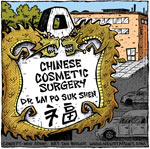What Is Liposomal Vitamin C?
| Share on Facebook | Share on Twitter | Share on Google+ |
For over 30 years leading medical researchers, including Nobel laureate Linus Pauling, have made numerous claims about the healing properties of vitamin C. Vitamin C has been shown to fight infection and even put cancer into remission—but none of the most promising claims for vitamin C are easy to prove.
The problem, it turns out, is that all kinds of vitamin C are not equally absorbed. Intravenous vitamin C and liposomal vitamin C are vastly superior to everyday vitamin C supplements.
The Power of Intravenous Vitamin C
Most of us think of vitamin C as an antioxidant. Taken in low doses, it is. When high-dose vitamin C is used to treat cancer, however, it does its work by acting as a pro-oxidant, actually increasing the action of free radicals against cancer cells.
To get the very high concentrations of vitamin C needed to fight cancer, it's necessary to bypass the digestive tract. Intravenous vitamin C is prepared by a pharmacy and a health professional with the training to administer and monitor vitamin C, which usually must be ordered by a doctor, to give the equivalent of a 10,000 mg dose every day.
When vitamin C is administered through the veins, cancer can be treated. The US FDA is not, by the way, planning to restrict this therapy. Dozens of Internet sites erroneously reported that the FDA was making the treatment illegal when actually the problem was a single pharmacy that had not taken steps to prevent contamination of its product with tap water—not something you really want to drip into your veins. Intravenous vitamin C is a potent tool for powerful healing. But what if you don't need to treat cancer?
The Power of Liposomal Vitamin C
Sometimes you need a quick delivery of vitamin C to kill an infection, but you don't need a huge dose of vitamin C to fight an infection. And probably you don't want to give yourself an IV drip.
That's the time liposomal vitamin C is best. In fact, any time you want to take a vitamin C supplement, the liposomal form is best.
Liposomal vitamin C is a chemical combination of vitamin C and lecithin. Made by shaking vitamin C and lecithin with the help of ultrasound, liposomal vitamin C is converted into a form that not only dissolves in the fluids in your stomach, it also mixes with the healthy fats released by digestion in your small intestine.
Liposomal vitamin C "catches a ride" with healthy fats and is more completely and quickly absorbed into the bloodstream. Liposomal vitamin C stays in your body longer and accumulates on the outside of cells to protect them against infection. Regular vitamin C is excreted in just a few hours and it's hard for your body to accumulate enough. But you can take liposomal vitamin C in smaller doses as an antioxidant for fighting the effects of cholesterol or joint health, or in larger doses for treating infections and supporting recovery from cancer.
How to Get Your Liposomal Vitamin C
There are recipes on the Internet for making liposomal vitamin C at home. There is a very special reason that you should not make your own. Making a liquid liposomal vitamin C creates a product that reacts with the air.
Just the tiny amount of air in the top of your bottle with make the liposomal vitamin C you make go bad in hours. And do you really have an hour or more to work with your liposomal vitamin C ingredients and ultrasound machine every time you need to take liposomal vitamin C?
It's always best to buy liposomal vitamin C in capsules. The product keeps better and longer if the bottle is not exposed to heat or light. You should not use liposomal vitamin C or any antioxidant past its expiration date. But encapsulated liposomal vitamin C is the most powerful antioxidant you can take for supporting good health.
References:
Wakabayashi H, Matsumoto H, Hashimoto K, Teraguchi S, Takase M, Hayasawa H. Inhibition of iron/ascorbate-induced lipid peroxidation by an N-terminal peptide of bovine lactoferrin and its acylated derivatives. Biosci Biotechnol Biochem. 1999 May;63(5):955-7.
-
Skin CareMen Skin Care
-
Free ResourcesFree eBooks
-
A good laugh and a long sleep are the best cures in the doctor's book.Irish Proverb
-
Featured Health Supplement
 The restoration and maintenance of normal organ and brain function and a strong immune system is the key to vibrant health and in
avoiding premature-aging!
The restoration and maintenance of normal organ and brain function and a strong immune system is the key to vibrant health and in
avoiding premature-aging!
-



















